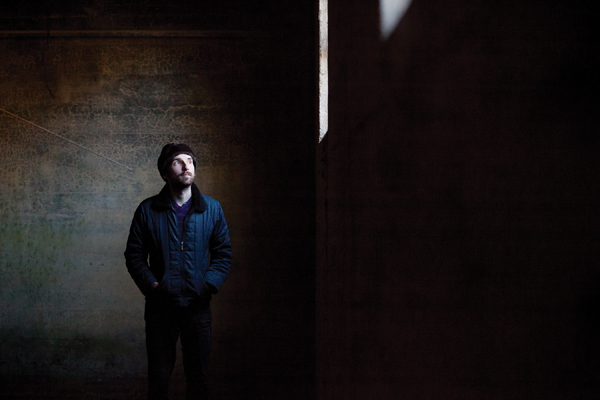Exploring Experimental Pop Collages with Jordan Lee
In just a matter of months, Mutual Benefit has gone from passing the hat at a house show to being declared the next big thing. For Jordan Lee, the songwriter and leader of this mutable indie pop project, it’s a far cry from what he initially intended. “Mutual Benefit was where all my weird music went,” Lee says. Starting in 2008 as way to separate the more traditional pop music Lee was making under his name from the more experimental sound collages he was moving toward, the two projects soon became one. While it’d be hard to label it experimental music, the project’s penchant for lo-fi field recordings and its constantly fluctuating line-up makes it different from your average pop band.
“Mutual Benefit’s been experimental not in the sense of being weird, but just experimental like, “I wanna try this thing out!’” Lee says. The sound Lee has cultivated over the last four years is a nice middle ground between worlds — an addicting and accessible experiment.
Mutual Benefit’s new album, Love’s Crushing Diamond, is Lee’s most thought-out pop experiment yet. Lying between a meticulously composed epic and the most transcendent jam session ever, it’s one of those albums that doesn’t come around very often. In short: It’s an album for people who love albums. The songs work so well together that after a few listens it’s hard to say what the single might be because it feels like one half hour-long song – slowing building, subtly referencing itself, working toward a complete thought. Using recordings made on $30 home recording equipment and hand-held recorders and mixing them with lush studio recordings, the album plays with the dichotomy of lo-fi ethereal and close-mic clean. The result is an album that feels intimate and personal while also feeling big and expansive.
And it’s this album that has taken Lee out of obscurity and into the spotlight. Initially released by some of Lee’s friends, who used their tax return money to press the album to vinyl, the record immediately sold better than any of them expected. But then a Pitchfork write-up that praised the song “Advanced Falconry” – essentially calling it the great modern mixtape song – led the album to selling out in a day. Soon after, the LP was re-released through Brooklyn label Other Music Recording Co. and in less than two months received more glowing reviews than most artists get in their whole career. Quitting his job and putting a hold on the house show circuit, he’s suddenly a full-time musician playing big showcases and moving into a world where there are people whose livelihoods depend in part on how well his album does – which is a little unfamiliar to Lee. “There is this motive that I’m not used to being there,” he says. Having his own livelihood depend on his music is even less familiar, but something he’s adjusting to. Lee says, “As a human being there has to be a certain level of bullshit in your life. And for a while bullshit was my money job and then I could make music 100% for fun. And now music is both the bullshit and the fun thing in my life…I think I like it for now.”
Lee’s tender voice, sound experimentation, and use of both orchestral and electronic elements have drawn many comparisons to Sufjan Stevens and early-2000s projects like The Microphones. These are not unfair comparisons by any means, but Mutual Benefit is an interesting intersection of music. His indie pop doesn’t follow traditional song structures and manages to stitch together musical worlds without showing the seams. Take the vocals out and it could easily be compared to the ambient work of Eluvium or Colleen, or the less beat-driven work of Four Tet.
The new album’s strong thread and happy/sad tone give it many of the same qualities that made Bon Iver’s For Emma, Forever Ago album so special. And if you get caught up in the slow builds and lyrics’ natural imagery, it begins to feel like some of the more mellow psych-folk of the ’60s and ’70s.
Lee says his inspirations often come from albums that mix pop music with idiosyncratic symphonic arrangements, mentioning Nick Drake’s Five Leaves Left and Joanna Newsom’s Ys as “albums I can’t go through a week without listening to,” while his more experimental side has largely been fueled by the catalog of Finnish label Fonal Records – in particular their 2008 release from Finnish band Paavoharju, Laulu Laakson Kukista, a texturally-rich ambient-noise album recorded at a cathedral in the woods of Finland. Lee lovingly talks about how different parts of the album sound like they were made by someone walking through a room and briefly recording the musicians while passing through. “That just totally blew my mind,” Lee says, “to actually feel movement within a song.”
While the next Mutual Benefit album might have more financial support behind it than previous efforts, Lee doesn’t see it changing his desire to play with movement and fidelity. “Sometimes I hear a band and, you know, their first album they had to do it themselves and it sounds like it was recorded in a basement or something. And their follow-up album is their first time in a studio and oftentimes a lot of stuff gets lost, like it just sounds too smoothed over,” he says. “I guess I’m hoping that doesn’t happen to me.” To him, keeping the life in a recording is more than just equipment and fidelity, “part of it too is just leaving some of the mistakes in and, I don’t know, just making it sound more human. I think that can be translated through fancy or not-fancy equipment.”
Almost instantly following any success story, there’s always the question of how to follow it up. Lee takes this pressure in stride, though, saying he’s less worried about keeping the popularity going and is more concerned with staying artistically driven. And though he’s happy to ride the wave while it’s here, he says he never wants to be above playing a house show or self-releasing a cassette. When asked what he wants the future of Mutual Benefit to look like, Lee simply says, “If I could just stay inspired as much as possible, I’d be happy.”
photography by Whitney Lee


